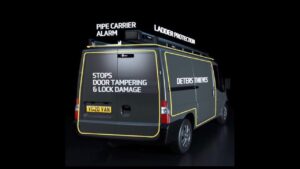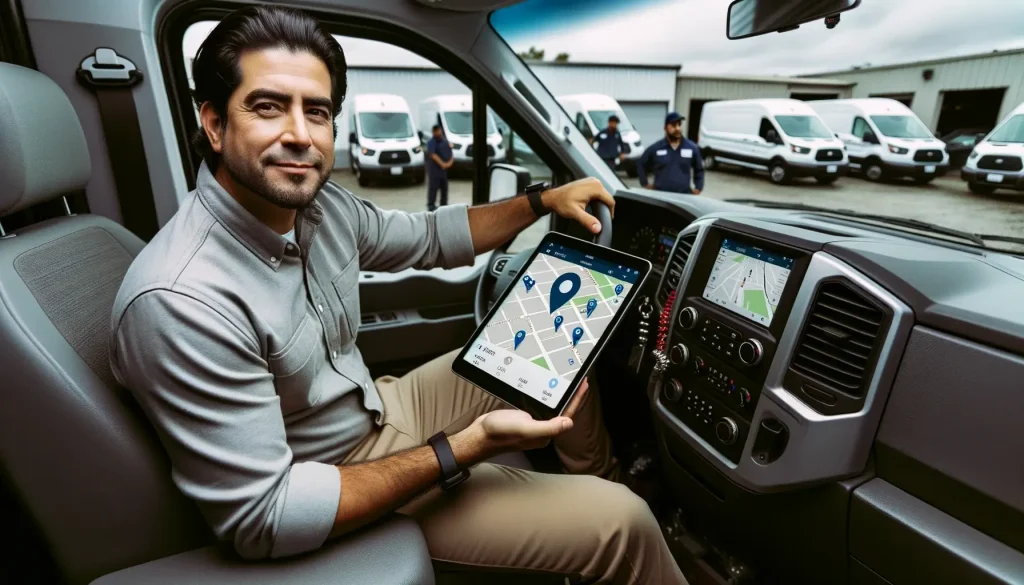

When it comes to vehicle security, especially for tradesmen with work vans, car alarms play a crucial role. There are two main types of car alarms: factory and aftermarket.
Factory car alarms are those that are installed by the car manufacturer. They are built into the vehicle’s system and offer integration with the vehicle’s electronics and security systems, providing a more seamless user experience.
On the other hand, aftermarket car alarms are those installed after a vehicle is purchased. These alarms are usually more robust and come with better alarm systems compared to factory-installed alarms. Aftermarket car alarms can also be customized based on the vehicle owner’s specific needs and preferences, allowing for a tailored security system that fits the individual’s requirements (Car Audio SD).
Aftermarket car alarms offer an array of features that provide enhanced protection for vehicles. For instance, they often include additional sensors such as shock sensors, glass break sensors, and motion detectors. These features provide added protection against break-ins and thefts.
Some aftermarket car alarms also feature a 2-way remote system that notifies the vehicle owner when the engine has been started, even if they are not in the car (CarLock). This can be particularly useful for van owners who need to monitor their vehicle even when they are away.
Other popular features of aftermarket car alarms include remote start, keyless entry, and smartphone integration. These not only provide convenience but also add functionality for the vehicle owner.
For those looking for specific features to enhance their van’s security, consider reading our articles on van security systems and van security alarms. If you’re interested in proximity alarms, you might find our articles on car alarms with motion sensors and car alarms with proximity sensors helpful.
By understanding the key differences and features of factory and aftermarket car alarms, you can make an informed decision about the best security solution for your vehicle. Remember, the safety of your ride is paramount, and investing in the right security system can provide peace of mind.
When it comes to ensuring the security of their work vans, tradesmen often seek the most reliable options. One such option is aftermarket car alarms, which offer a number of advantages over factory-installed alarms.
Aftermarket car alarms offer more features and benefits compared to basic car alarms that come pre-installed with vehicles (CarLock). These alarms are robust and provide better protection systems compared to factory-installed alarms.
One of the key features of aftermarket car alarms is the two-way remote system. This system notifies the owner when the engine has been started, even if they are not in the vehicle. This can be particularly useful for van owners, alerting them of potential unauthorised access.
Moreover, aftermarket car alarms often include features such as remote start, keyless entry, and smartphone integration. These features not only provide increased security but also add convenience and functionality for the vehicle owner.
Additionally, aftermarket car alarms often come with extra sensors such as shock sensors, glass break sensors, and motion detectors, providing enhanced protection against break-ins and thefts. For more information on these features, check out our articles on car alarm with motion sensor and car alarm with proximity sensor.
One of the key selling points of aftermarket car alarms is their customisability. They can be tailored to the specific needs and preferences of the vehicle owner, allowing for a personalised security system that fits their requirements (Car Audio SD).
This customisation can be particularly beneficial for tradesmen, who often use their vans for both personal and professional purposes. Whether it’s adding extra sensors or integrating the alarm with a smartphone app, these customisations can provide an additional layer of security and peace of mind.
Moreover, aftermarket car alarms can be installed in older vehicles that might not have a factory-installed alarm system. This allows owners of older vans to upgrade their vehicle’s security without purchasing a new vehicle.
In conclusion, when choosing between factory and aftermarket alarms, it’s important to consider the specific needs and preferences of the vehicle owner. While factory alarms may offer better integration with the vehicle’s electronics, the additional features and customisability of aftermarket car alarms often make them a more suitable choice for tradesmen and other van owners. For more information on this topic, check out our articles on van security systems and van security alarms.
When it comes to securing your vehicle, particularly for tradesmen with work vans, it’s important to consider the cost of aftermarket car alarms. The cost of these systems can vary depending on their features and installation fees.
The average cost of a basic aftermarket car alarm/security system is around £150 to £200, according to Compustar. These systems generally include features such as an alarm, keyless entry, and possibly a starter kill switch.
More advanced car alarm/security systems with additional features like remote start or smartphone integration can cost anywhere from £250 to £500. This may seem like a significant investment, but the added security and convenience these systems provide could be worth the cost, especially for van owners who store valuable tools or equipment in their vehicles.
| Type | Cost Range |
|---|---|
| Basic Systems | £150 – £200 |
| Advanced Systems | £250 – £500 |
In addition to the cost of the aftermarket car alarm itself, you’ll also need to consider installation costs. The price of installation for a car alarm/security system may vary depending on the complexity of the system and labour rates in different areas.
While it might be tempting to try and install the system yourself to save money, it’s usually best to have a professional do the job. This ensures that the system is installed correctly and will function as intended.
Finally, it’s worth noting that aftermarket car alarms are generally more affordable compared to factory car alarms, making them a popular choice for vehicle owners.
When considering the costs of aftermarket car alarms, it’s important to balance your budget with your security needs. For more information on different types of alarm systems, check out our articles on car alarms with motion sensors and car alarms with proximity sensors.
![]()
GPS technology has revolutionized vehicle security. By integrating GPS tracking with aftermarket car alarms, vehicle owners can enjoy enhanced protection and peace of mind.
GPS tracking plays a pivotal role in modern vehicle security. A GPS tracker can provide real-time location tracking of your vehicle, making it invaluable in case of theft. Additionally, some GPS trackers like CarLock can send notifications in case of unusual events such as engine start, vibrations, or unexpected movements. This feature can be particularly useful for van owners, who often store valuable tools and equipment in their vehicles.
Moreover, with features like recording routes taken by the vehicle, a GPS tracker can also serve as a handy tool for parents with teen drivers. It can detect and notify you of troubling driving behaviours, ensuring the safety of your young driver while they’re on the road.
When combined with aftermarket car alarms, GPS tracking can provide a comprehensive security solution for your vehicle. Aftermarket alarms often come with additional sensors and features, such as shock sensors, glass break sensors, and motion detectors, providing enhanced protection against break-ins and thefts (Car Audio SD).
For instance, you could have a car alarm with motion sensor or a car alarm with proximity sensor, which can send alerts if someone or something gets too close to your vehicle. This can be especially useful for tradesmen with work vans, who often park their vehicles in public and unattended areas.
One of the primary benefits of aftermarket car alarms is the ability to customize the security system based on your specific needs and preferences. This allows for a tailored security system that fits your requirements. Additionally, many aftermarket car alarms include features such as remote start, keyless entry, and smartphone integration, providing convenience and added functionality.
In conclusion, combining GPS tracking with van security alarms can provide a robust and efficient security solution, ensuring the safety of your vehicle and its contents. By understanding the benefits of these technologies, you can make an informed decision and choose the best security solution for your needs.

When it comes to vehicle security, particularly for tradesmen with work vans, choosing the right car alarm is crucial. This decision hinges on a clear understanding of your security needs and the available options in the market.
The first step towards choosing the right car alarm system is to assess your specific security needs. For instance, those who park their vehicles in high-crime areas may require more advanced security features.
Aftermarket car alarms, which are installed after a vehicle is purchased, offer a wider range of features and customisation options compared to factory car alarms. They are usually more affordable, making them a popular choice for vehicle owners.
For tradesmen with work vans, options such as a car alarm with motion sensor or a car alarm with proximity sensor may be beneficial. These alarms can alert you when there’s movement near your vehicle or when someone gets too close, providing an added layer of security.
While assessing your needs is important, it’s equally vital to consult with professional installers. A professional can help you understand the various features of different alarms and guide you towards the best system for your vehicle. They can also ensure the alarm is properly installed for optimal performance (Jerry).
Remember, factory car alarms may offer better integration with the vehicle’s electronics and security systems, providing a more seamless user experience. However, if customisation and price are your key concerns, aftermarket car alarms might be the better choice.
Ultimately, the decision should be based on your individual security needs, your budget, and the expert advice of professional installers. For more information on securing your work van, explore our articles on van security systems and van security alarms.

Michael Horsfall, a seasoned plumbing and heating engineer with over 35 years of trade experience, is the innovative mind behind VanGuardian, a proactive van security solution. His journey into the realm of security was triggered by recurrent incidents of theft, particularly copper pipe theft right from outside his residence in Leeds. The rampant van crimes led him to envision VanGuardian, a patented alarm system engineered to deter theft by activating upon contact, safeguarding assets before any damage occurs. Michael's in-depth understanding of the challenges faced by tradesmen, paired with his endeavor on Dragons' Den to secure investment, underscores his commitment to fostering van safety. His profound expertise and real-world experience equip him with a distinctive insight, making his blogs an invaluable resource for individuals seeking pragmatic advice on van safety and security.